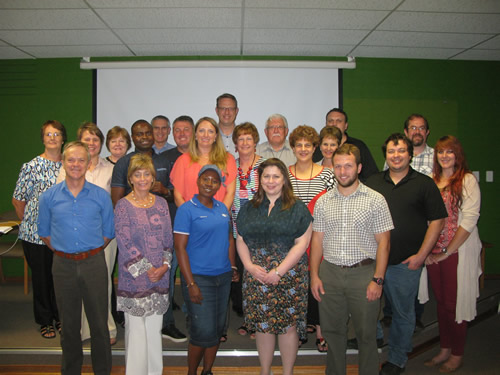Traditionally employees in an academic organisation’s support services were seen as service providers only when it came to research projects.
Due to the changing landscape of research, projects often need much more specialised technology and expertise and include larger, interdisciplinary teams. Support staff are frequently not only fulfilling a service provider role anymore, but in many instances have to become a collaborator and embed themselves in research teams.
Through the activities of the eResearch Initiative and other related initiatives at NWU, it has become clear that new skills, networks, vocabularies, and mentorship models are needed to help service providers transition into the role of collaborator. Line managers and decision makers should also be made aware of the changing landscape of research support and should be equipped to help their staff face new challenges and exploit new opportunities. Meet the

NWU’s Research Enablers…
In January this year NWU eResearch ran its inaugural Research Enablers Event where staff from IT, libraries, the research support office, technology transfer and innovation support, amongst others met to discuss their various roles in supporting specifically research data management. Nearly 30 people participated in this very interactive workshop and everybody had the opportunity to share how they are currently supporting research and where they are experiencing challenges.
The guest speaker, Pip Willcox (director of the Centre for Digital Scholarship at Oxford University) shared some of her experiences in terms of the changing role of research support staff. Pip’s visit to the NWU was jointly funded by the Digital Humanities Association of Southern Africa (DHASA) as this coincided with the inaugural DHASA conference in Stellenbosch. Staff from the NWU Digital Humanities Initiative has played a key role in bringing the enabler events to life, along with IT, the research support office, and the libraries.
The main aim of the event was to provide a platform for building a community of empowered research support staff (or research enablers). Feedback from participants was very positive and it was agreed that the aim was met, as several participants had the opportunity to meet new colleagues in various departments playing complementary roles in terms of research support.
The next Research Enablers Event will take place on 11 May at Mahikeng Campus. We are expecting almost 30 participants again. The guest speaker will be Dr Aleksandra Pawlik from the New Zealand eScience Infrastructure who has been involved in research support for several years (both in the UK and in New Zealand). We look forward to another exciting opportunity to strengthen collaborations with our enablers.
